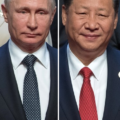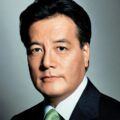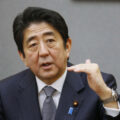The Russian War in Ukraine: An Invasion Named “Liberation”
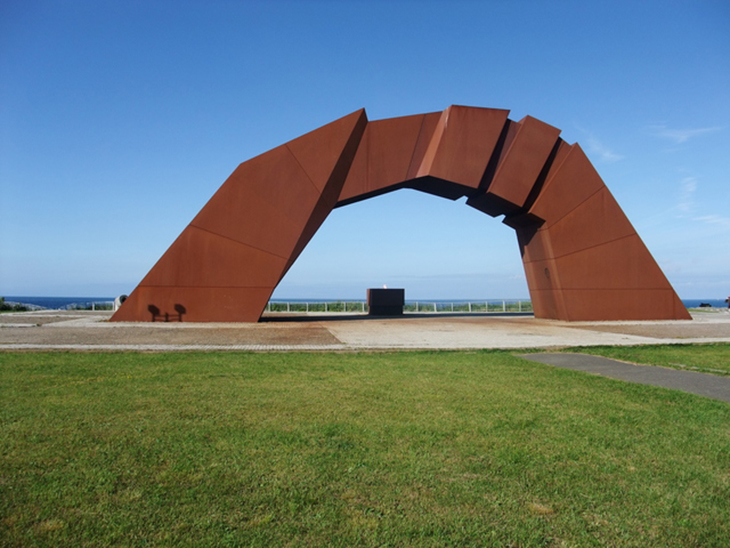
The “Bridge of Territories (Shima-no-Kakehashi)” which stands at the tip of Cape Nosappu in Nemuro City, Hokkaido is a monument that expresses the people’s desire to regain the Northern Territories. The “Fire of Prayer” brought from Okinawa continues to burn under the arch.
Iwashita Akihiro, Professor, Hokkaido University
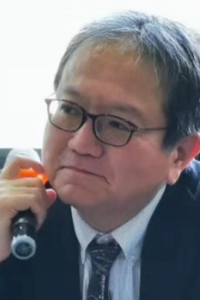
Prof. Iwashita Akihiro
Fukuzawa Hideo, an inhabitant of the Habomai Islands, one of the four Northern Territories, has this to say about the Russian invasion of Ukraine: “It brought back strong memories of how Russia expelled us from our island. A TV report showing crying children under attack in Ukraine reminded me of myself at the time.”
On August 18, 1945, when the Soviet Union army began its invasion and occupation of Shumushu Island at the northern edge of the Kuril Islands of Japan, there was fierce fighting with the Japanese army units they encountered. Japan had already accepted the Potsdam Declaration on August 14 and implemented “disarmament” of the Southern Kurils (Etorofu and Kunashiri), Shikotan and Habomai Islands. It therefore offered no resistance to the Soviet occupation after the battle of the Northern Kurils. Many Japanese soldiers were sent to Siberia as prisoners of war, and local residents were forced to leave their islands by the Russian authorities and had to stay away until 1948. Subsequently, the Russians moved and we ended up at the situation we have today.
Russia say that they “liberated the Kuril Islands from Japanese militarism,” but in fact the Soviet Union unilaterally ignored the Soviet-Japan Neutrality Pact, and invaded and conquered Japanese territory. The islands were made into Russian territory by ejecting residents by force and having Russian nationals move in. In the Russian dictionary, “liberty” means “invasion.”
Even You, Ukraine?
Why did Russian President Vladimir Putin initiate this invasion? Let us take a look at his reasoning in a public speech[1] that he gave right before the invasion. First, it was to counter the eastward expansion of NATO. At the end of the Cold War, the West said it would not expand NATO. But they have not kept their promise, instead expanding its size and acting provocatively toward Russian borders. Second, he said that the United States is the root of all evil. The United States is an “empire of lies” that violated international law in Iraq, Syria, Libya and so forth. Third, he said that Ukraine was massacring civilians in the eastern parts of the country and that this must be stopped. This last argument is thought to be the direct reason for the invasion.
All of his arguments are “lies” or self-justification. The first point can easily be counter-argued. For example, Norway, which borders the Soviet Union, joined NATO as a founding member but did not deploy foreign (non-Norwegian) forces even under the NATO treaty, understanding Russia’s concerns. In the earlier post-Cold War period, the Baltic states, which also share a border with Russia, joined NATO in 2004 in the Putin era. In the same year, Slovakia, Romania, Bulgaria and others joined. What has Putin been doing for nearly 20 years?
To begin with, NATO enlargement in the post-Cold War period has not been a simple story of the United States tricking Russia in order to expand its “sphere of influence.” The “Partnership for Peace (PfP)” by the Clinton administration [in 1994] was rather a means to put a brake on NATO enlargement, paying attention to Russia. There was even talk of Russia joining NATO. Reality branches out from that point. Some of the East European countries such as Poland, the Czech Republic and Hungary, believing that a “thaw” would not last long, aimed to join NATO all in one go, and this was realized in 1999. They feared that if they missed the opportunity, Russia would eventually “come back.” There may have been pro-Eastern Europe lobbies in the United States, and the PfP then turned out to be a step toward NATO membership. In response, Russia demanded certain privileges, such as veto powers, as a condition of NATO membership. NATO refused. Russia grew increasingly distrustful of the eastward expansion. Given this background, it is unreasonable to claim that NATO enlargement alone triggered this invasion. So why? They could not allow it because it was Ukraine.
Russia’s roots lie in the Kievan Rus. It is often said that Russia and Ukraine were one. I will not go into the history here, because the history of Ukraine cannot be simplified. Suffice to say, the territory is vast and diverse with influence from Lithuania, Poland, the Crimean Khanate, and the Hapsburg and Ottoman Empires, except Russia. Every city has a different profile, more profound than simply the territory’s east and west. A famous German historian, Karl Schlögel, defines Ukraine as a “borderland” country and a “miniature of Europe[2].” From Ukraine’s point of view, there have always existed centrifugal forces emanating from Russia on the historical basis of past experiences such as the Communist “invasion and rule” and Stalin’s Holodomor (Terror Famine), but Putin strongly believed that Ukraine should be with Russia (and Belarus), rejecting the country’s own path. Ukraine, the “closest relative” of Russia, was turning towards the United States. This was the end result of Eastern European countries leaving Russia one after another, drifting to the other side. Putin must have thought that the Ukrainians would never do such a thing under normal circumstances. They are surely being threatened and deceived by the United States. Wake up, my brothers. The impure ones shall be cleansed by me. Thus began the “fratricide.” Nothing is more unforgivable than a traitor in your family. There is a kind of gangster logic about setting an example. So this is not a war between countries. It is simply a holy struggle to set straight a brother who has lost his way.
“Derzhava”: The Great Power’s Mission
Then we have the second reason in Putin’s speech about the “empire of lies” America. This seems convincing at first glance. The United States is said to have acted in innumerable ways in violation of international law, including the war in Afghanistan that was retaliation for 9/11 and the war on Iraq of 2003 on the pretext of Iraq possessing nuclear weapons (which was later found to be untrue). It was not so long ago that the US Special Forces captured Saddam Hussein alive and killed Osama bin Laden. I am sure quite a few would agree with criticism against the unilateral military actions of the United States, conducted in the name of “democracy” by a “superpower.”
The problem is what comes after that. In the background, it is clear that this is supposed to justify the idea that “so Russia can do it too.” What is so wrong about Russia as the great power with nuclear weapons doing the “same thing” as the United States? Why is Russia so criticized when the United States is not? It is “discrimination.” After the invasion, there was news that Putin’s approval ratings were rising, but that is better interpreted simply as a result of Putin’s repression of the people and information control. I remember the message of the world-famous figure skater Evgeni Plushenko to “Stop discrimination against Russians” and “Russians, raise your heads.” He recently supported Putin’s full-fledged war expressing his will to go to the front[3]. In a sense, that was an expression of the intuitive nationalism of Russians.
What we must not make any mistake about is that the Russians do not believe themselves to be the “loser” of the Cold War. They believe they overcame the Cold War together with the West. But the reality is that they are treated like a “loser.” They have endured that humiliation, but are now at their limit.
We fellow researchers have a similar story. Initially, we thought “All Russian researchers are against the war, but they can’t speak up before Putin.” Of course, there are quite a few conscientious researchers against the war, but I have heard that there are also many scholars who praise Putin and send out messages of wholehearted support. Russian ressentiment runs deeper than we can imagine, and I presume that there are many people who wholeheartedly support this “war” (which they call a special military operation).
I feel that their excessive self-awareness also plays a role in this. Russia was often criticized overseas in the period of the Soviet Union for its “Great Powerism.” They call it “Velikaia Derzhava” in Russian. The criticism referred to the Soviet Union’s invasions of Czechoslovakia and Afghanistan. Yet this was not something many Russians ever understood in the first place. They simply think “Russia is naturally greater. These things happen because we’re a great power.” Russians seldom recognize that their “great” behavior irritates those in surrounding countries. On the contrary, they really believe that they are doing their neighbors a good turn.
Russia, like the United States, is a great power with a mission (but in a different sense). Russia, which is oppressed in Europe, prides itself on its civilized nature with regard to eastern Eurasia and has tried to enlighten the more barbaric East. It also does not hesitate to use force. The history of the Far East has been one of Russian expansion, involving local massacres and subsequent relocation of Russians (often Ukrainians) there. After having conducted repeated local massacres, Yerofey Khabarov (1603–1671) became one of the Russian “great men,” and the name Khabarovsk comes from him. Vladivostok literally means “Ruler of the East.” All of these were sacred acts from Russia’s point of view.
On the other hand, their mission vis-à-vis other peoples is simple in terms of control. “Just do as Russia says.” According to Dr. Aoshima Yoko of the Slavic-Eurasian Research Center, Hokkaido University, the Soviet understanding of history used to consider the Russian Empire as a “prison of nations” and emphasized the harshness of the rule in the form of Russification. However, recent historical studies have tended to argue that Russia’s assimilation policy was loose and recognized diversity as a “cradle of nations.” If you compare this to the Putin administration, the handling of the Chechen Republic is a typical example. Kadyrov’s dictatorship, which was worse than that of any gangster’s, was friendly with Putin and so was given free rein. Putin is very kind to “friends” who do not go against Russia and who listen to Russia.
Mocking International Law
Even if this in itself is nothing new, Putin’s final emphatic claim of genocide by Ukraine is interesting. When Putin launched the annexation of Crimea in 2014, he applied the principle of the “right to self-determination” in the United Nations Charter while citing Ukrainian persecution of Russian residents. The Crimean Peninsula has about 60% Russian residents and by using the argument that they wish to belong to Russia, the goal was achieved “peacefully” through a referendum. As the original triggers, the Russian interference with the expulsion of the pro-Russian regime by the Ukrainian democratization movement (Maidan) and their military intervention in eastern Ukraine are considered problematic. It is true that the principle of the right to self-determination constantly infringes on territorial integrity in international law, and difficult issues in world conflicts have often had to do with this balance.
This time, the true intention of Putin’s use of genocide as an expedient is not clear, but the Russian residents of Lugansk and Donetsk oblasts in eastern Ukraine, of which part came under control with the 2014 conquest, make up only 40% of the total population, while control also extends only to part of the oblast, so using the “right to self-determination” as the main reason was probably not feasible. As such, they came up with the pretext of protecting Russian residents by turning genocide by Ukraine into an excuse. But this short-sighted approach has had serious consequences that undermine its own legal legitimacy.
The Convention on the Prevention and Punishment of the Crime of Genocide (Genocide Convention) is known as a breakthrough born from sincere reflection on the Nazi genocide. The convention punishes not only those responsible for ordering the genocide, but also those involved on the ground, including private persons. Conventional legal thinking considered the organizational integrity of the military and was aimed only at those giving the orders, but regret over not having been able to stop the actual massacres has led to prosecution also of those who commit the acts. The Soviet Union and Ukraine (which had a separate seat at the United Nations) signed the Convention in 1954. At the time, both had reservations about Article 9 of the Genocide Convention, a clause that required disputes to be resolved in the International Court of Justice, but they withdrew their reservations in 1989 and, as is well known, Russia became the legal successor of the Soviet Union and remained a signatory.
Ukraine appealed to the International Court of Justice for Putin’s use of a genocide in the east by Ukraine as a reason for military invasion. The International Court of Justice (a majority with the exception of China and Russia) ordered Russia to suspend the military operations as a kind of provisional measure before conducting a trial to verify veracity of the genocide claim[4]. In short, it took procedural steps to seek a “preservation of rights” for the trial and ordered an immediate suspension of military operations.
Russia has completely ignored the binding directives of the International Court of Justice. This not only has made the world aware that Russia is willing to break international laws that it has accepted, but it also suggests that Russian claims cannot withstand legal debate. Currently, massacres perpetrated by the Russian Armed Forces against civilians around Kiev and elsewhere (as part of the Russian invasion of Ukraine) are becoming apparent. Suspicions about genocide are falling not on Ukraine but on Russia. This genocide debate is a double-edged sword for Russia.
Invasion Labeled as Liberation
Simply put, what Russia has done to Ukraine during the post-Cold War period takes on the appearance of a conventional gangster tactic of territorial expansion. First, at the time of the dissolution of the Soviet Union, Ukraine relinquished its nuclear weapons in exchange for the promise that Russia would guarantee its sovereignty and territorial integrity (Budapest Memorandum on Security Assurances). Russia then annexed Crimea on the grounds of a right to self-determination, and even while ensuring that the eastern parts were Ukrainian territory, the Russian army was sent in to effectively establish some control under the guise of “special status” (Minsk Protocol, Minsk II). Russia subsequently made the accusation that Ukraine was not fully complying with the agreement, threatening (a non-nuclear-weapon state) with nuclear weapons and launching a military invasion. The hope was to capture Kiev and establish a Ukraine-wide government that bows to Russia. Even if that were not possible, they could solidify Russian control in southeastern Ukraine.
Of course, such arrangements were one-sided, and there would in fact have been zigzags so that Russia had many opportunities not to cross the line. But as a result, from a one-track perspective, Russia, as a country that does not keep its promises, continues to deceive other countries, and expands its territory, is what became discursive here. And they do not notice this Russia as it is perceived by others. Russia is a great power that is only doing what is natural. It appears that they (somehow) honestly believe that they are setting straight Ukraine that has lost its way and that they should even be grateful.
This is a kind of disease. While the impact of COVID-19 on international relations cannot be measured, the diplomatic freeze of the past two years has caused countries to turn inward, with leaders becoming more introverted. This is an unsubstantiated hypothesis, but without COVID-19, diplomacy might have been effective before things got this bad.
Today’s Putin is somewhat reminiscent of Stalin, albeit on a different scale. Stalin, willing to sacrifice many of his own people in collectivization and concentration camps, invaded Poland, annexed the Baltic States and some parts of Galitia (Lviv) and Bessarabia, waged war on Finland, and restored many of the territories that had shrunk in the Russian Revolution to what they had been in Czarist Russia. He was a “great man” who won the German-Soviet War, liberated the Nazist Ukraine and expanded their sphere of influence to the East European countries, and elevated the country’s position to that of a global great power alongside the United States.
Along with the territorial expansion, Stalin did not hesitate to forcibly move residents (through expulsion or relocation to other parts of the region). Every time I think about what is happening in Ukraine right now, Stalin comes to mind.
Cold War 2.0?
Putin’s goal is said to be to change the current US-centered international order. I think the current situation is similar to what we had after World War II in the early Cold War when the spheres of influence had yet to be settled[5]. It is fluid where lines are to be drawn, but new national borders are likely to be established when military action stops. The world is divided into “unfriendly countries” and “friendly countries” with regard to Russia, and so a second Cold War begins. The question is how far it will extend beyond Europe. Combining territories controlled by Russia, including most parts of the two “people’s republics of Donetsk and Lugansk,” Putin eventually annexed them into the Russian Federation. However, the “border” between Russia and Ukraine has been fragile and far from fixed. Under Russian rule, the replacement of residents and erasure of “Ukraine” could take place. By contrast, current Ukraine might be called a “democratic republic” and may join NATO. The boundaries, even unfixed, will became a fortress, dividing “friend” and “enemy” for decades.
The former Cold War was also a struggle between different economic systems: socialism and capitalism. But now Russia is embedded in the interdependence of the world economy, which is why Western economic sanctions are beginning to take effect. China is the key here. China, one of the world’s leading economic powers, is now building its own renminbi system that does not rely on foreign countries. Will Russia, cornered by economic sanctions, become more dependent on China as one of few friendly countries? But economic dependence on China could end up meaning that Russia clings to a country they looked down on as a “little brother” during the Cold War period. Russia as a great power may self-destruct.
What will happen to Northeast Asia, where we live? North Korea has become more confident about its own correctness in continuing nuclear development, welcoming Putin’s strong stance vis-à-vis the United States by launching missiles. On the other hand, it is unclear whether Japan and South Korea, who stand on either side of the chasm of historical and other issues, can work together with the United States as they once did.
China also appears to be faltering. Even if Xi Jinping had given the green light to the war, he would not have anticipated how protracted it has become. Supporting Russia has the merit that it weakens the position of the United States, but it also has the demerit that China is alienated from the world, just like Russia. China must be taking both aspects into account. There is the view that China will follow Russia in launching a liberation of Taiwan, but when you look at the probability of strong American involvement in Taiwan and consider that it will have to take the form of a landing war, it will by no means go the same way as Ukraine. Both China and Russia tend to be regarded as despotic states, but as their empires have different histories and ways of thinking, many Chinese people must have been astonished by Russia’s barbarism. Although the two countries now maintain a quasi-alliance, the Chinese have not forgotten how Russia invaded China in the 19th century and held back China again in the 20th century under the guise of being a liberator from Japan. The same is true of the border clashes between the two countries in the 1960s, which were said to have nearly escalated into nuclear war. Chinese intellectuals familiar with history have anticipated and prepared for this Russia today since immediately after the dissolution of the Soviet Union. Even if it will not happen right now, they will probably not rule out the possibility that Russia may head eastward again.
When war envelops a region, the first places to feel the most tension are the national borders. Just like in the Cold War period, rumors began to circulate that Russia would invade Hokkaido. The border is about to become a fortress again. Wakkanai City and Nemuro City, which could be termed Japan’s northern gateway, are facing exactly this crisis. Wakkanai was previously concerned with cross-border exchanges to the extent that there was a division in the city hall called the “Sakhalin Division,” bearing the name of the partner region, but this division has now been renamed the “International Relations Division” with Sakhalin-related projects more or less suspended. Despite the difficulties of the territorial dispute, Nemuro continuously interacted with the Russians of the Northern Territories with “travel without a visa” but has been forced to terminate the regime, so that former islanders’ possibilities to travel home to their islands are at risk. Negotiations on the Northern Territories aside, first and foremost, memories of the Soviet Union’s invasion are now coming back to life in us. The discourse surrounding Russia is divided into “enemy” or “friend” and forces us to take sides without any allowance for a gray zone. The wave of the second Cold War has not yet reached Northeast Asia, but the prospect of war looms.
Translated from an original article in Japanese written for Discuss Japan. [October 2022]
Keywords
- Iwashita Akihiro
- Hokkaido University
- Ukraine
- Russia
- Hokkaido
- Northern Territories
- Kuril Islands
- invasion
- war
- Potsdam Declaration
- Vladimir Putin
- United States
- empire of lies
- NATO
- genocide
- International Court of Justice
- liberation
- Stalin
- Cold War 2.0
- China
- national borders
- Nemuro
